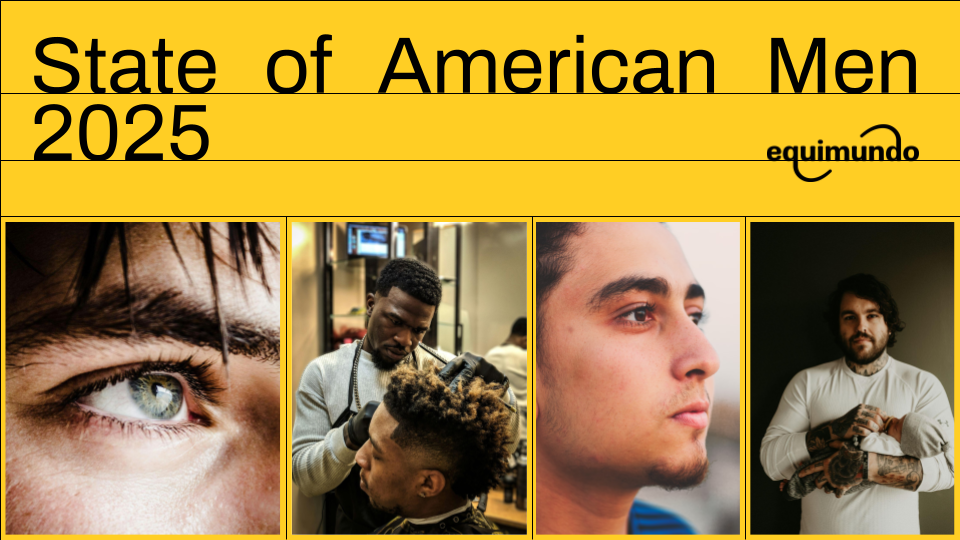For media inquiries, please contact:
📧 press@equimundo.org
The State of American Men 2025 report, Equimundo’s groundbreaking biennial study that looks at the emotional, economic, and cultural pressures facing American men shows that men are not in crisis because of who they are — they’re in crisis because of what they lack. The report argues that men’s current struggles stem not from inherent flaws, but from significant societal unmet needs.
Dr. Gary Barker, CEO & Co-Founder of Equimundo, emphasized the urgency of the findings: “As a nation, we can’t continue to ignore this. This isn’t about shaming men — it’s about understanding them. The State of American Men 2025 offers a roadmap for how we meet this moment with data, empathy, and a commitment to real solutions.”
Key findings from the study include:
- Economic Anxiety as a Defining Crisis: A striking 86% of men and 77% of women continue to define manhood by being a “provider.” The study reveals that financial instability is a critical risk factor, with men experiencing economic insecurity 16.3 times more likely to report suicidal thoughts. This economic strain is also found to reinforce outdated masculinity norms and contribute to an embrace of anti-democratic ideologies.
- Profound Isolation and its Fatal Consequences: More than half of both men and women (53%) report feeling that “No one really knows me.” For men, this feeling of being unknown is strongly linked to mental health, with those who feel unknown being 2.2 times more likely to have considered suicide in the past two weeks. Adherence to rigid gender norms, often termed the “Man Box,” is associated with an even higher risk, making men 6.27 times more likely to report suicidal ideation. Gen Z men and economically vulnerable men are particularly susceptible.
- The Rising Influence of the “Man Box”: Harmful beliefs about manhood, such as “a man should always have the final say” and “a gay man isn’t a real man,” have increased since 2017. Despite its isolating and damaging effects, the “Man Box” continues to function as a form of social “currency,” offering men a distorted sense of purpose and identity.
- The Dangerous Void Filled by Hardline Masculinity Culture: Men drawn to “manosphere” and hardline masculinity online communities often report feeling voiceless, invisible, and disrespected. While these spaces offer a sense of connection and advice, they also normalize misogyny, conspiracy theories, and authoritarianism. The study found that men endorsing “Red Pill” beliefs are 2.2 times more likely to trust authoritarian figures and are significantly more likely to own firearms.
- Troubling Intersections of Masculinity, Democracy, and Gun Ownership: The report highlights a growing trend with 30% of male gun owners now owning AR-15s. Men who adhere to traditional masculine norms or “Red Pill” beliefs are significantly more likely to distrust government institutions. As rigid masculinity intensifies, trust in democracy declines, creating a concerning overlap between manhood, grievance, and armed identity.
Solutions at hand:
- The report emphasizes an urgent need for targeted interventions, including:
- Mental health services that are tailored to men’s lived experiences.
- Economic policies that address inequality, insecurity, and evolving gender roles.
- Educational and community programs that foster emotional literacy, healthy masculinity, and a sense of belonging.
- Digital interventions to counteract radicalization and provide positive identity alternatives.
“Our research reveals what it means to be a man in America today – economic anxiety is undermining their sense of purpose and impacting their mental health. Many men are turning toward more rigid ideas about masculinity rather than embracing the caregiving roles that actually give them meaning,” said Equimundo’s Dr. Taveeshi Gupta, Director of Research. “The path forward isn’t about choosing sides. It’s about recognizing that the current system isn’t working for anyone and building solutions that address men’s real struggles while promoting healthier, more connected forms of manhood.”
“Solutions Exist — If We’re Willing to Act,” the report concludes, advocating for engaging men in caregiving and fatherhood, encouraging aspirational ideas of manhood in boys, supporting young men with mentorship, leveraging online influencers to promote positive masculine narratives, and galvanizing officials to prioritize economic security for all men.
The full report is available for download here.
Got questions or want to cover this story?
Reach out to us at press@equimundo.org
